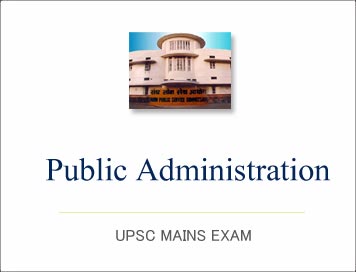(Exam Paper) UPSC IAS Mains 2005: Public Administration
(Exam Paper) UPSC IAS Mains 2005: Public Administration
Paper- I
Section A
1. Answer any three of the following in not more than 200 words each:
(a) “Administrative question are not political questions.” Discuss.
(b) “Organisation is’ a system of consciously coordinated activities or forces
of two or more persons.” Comment.
(c) In Follett’s view, “authority belongs to the job and stays with the job.”
Explain.
(d) “The failure of classical science of administration lies in its capacity to
confront theory with evidence.” Discuss.
2. In what ways and how can information technology play a crucial role in effective government-citizen interaction in the context of good governance ?
3. “Today the content of administrative law is driven primarily by the scope of public administration activity.” Explain.
4. What is judicial activism ? How far has it been successful in exercising a check over administration ?
Section B
5. Answer any three of the following in not more than 200 words each:
(a) “Development administration is starved for theories which will guide the
pooling of empirical knowledge, orient new research, and recommend
administrative policy.” Explain.
(b) “If positions are the raw material of classification, class is the operating
unit.” Discuss.
(c) “The budget is an instrument of coordination.” Explain.
(d) “No science of public administration is possible unless.... there is a body
of comparative studies from which it may be possible to discover principles and
generalities that transcend national boundaries and peculiar historical
experiences.” Discuss.
6. Why do public organisations evaluate employees’ performance ? How can performance evaluation systems affect employees’ behaviour ? How can administration effectively evaluate employees?
7. Give an assessment of the processes of policy formulation and discuss the problems of policy implementation.
8. Why does the issue of budgeting as politics versus budgeting as analysis remain important in the budgeting process? Do you agree that some synthesis of the two positions seems possible? Illustrate.
Paper - II
Section A
1. Comment on any three of the following in not more than 200 words each:
(a) “The Mughal Administrative System was a military rule by nature and was
centralized despotism.”
(b) “The veto-power of the Indian President is a combination of the absolute,
suspensive and pocket veto.”
(c) “The District Collector is an overburdened officer due to the expansion and
increasing developmental activities.”
(d) “A strong PMO is a salvation for any Indian Prime Minister, but
concentration of power is a danger to democracy.”
2. “The Chief Minister symbolizes ruling power structure and is the real executive head of the State Government.” Discuss the above statement in the light of his position in a Coalition Government.
3. (a) “The Cabinet Secretariat provides the eyes and ears for the
Prime Minister to keep in touch with the process of official business in Central
Government.” Comment.
(b) “The primary emphasis in District Administration has to be on implementation
of development programmes in cooperation with active support of people.”
Elucidate.
4. “Even after a decade of having adopted the 73rd Amendment to the Constitution, the Panchayat Raj institution still faces a number of problems towards making it a strong, and vibrant unit of Government.” Comment.
Section B
5. Comment on any three of the following in not more than 200 words each:
(a) “One of the most distinctive characteristics of Indian Administrative
Service is its multipurpose character.”
(b) “Public Accounts Committee conducts a postmortem examination of Public
Accounts.”
(c) “Efforts made towards administrative reforms so far have been lacking in a
congruence between strategy, structure and substance.”
(d) “The role played by Central and State Governments in maintaining law and
order is inadequate and unmatched to growing criminalization.”
6. “From highly centralized planning system, India has moved towards indicative planning under which long-term strategic vision of the future is built and nation’s priorities are decided.” Elucidate.
7. (a) “Audit provides a healthy safeguard against public money going
down the drain.” Comment.
(b) “National Development Council is criticized as an usurping authority
-functioning as a virtual super-cabinet.” Explain.
8. “The Lokayuktas in States have not succeeded in tackling mal-administration, while the Bill on Lokpal still faces stiff opposition on the floor of the Parliament.” Comment.


